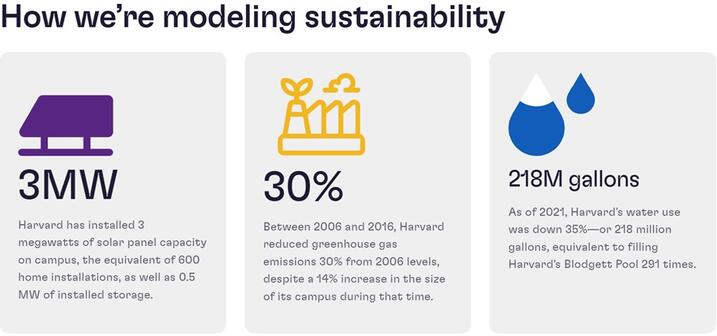B-2 B-Well: Circle of Life
Environmental wellness demands attention to nature’s impact on us—and ours on it

“Environmental well-being means leading a lifestyle that values the relationship between ourselves, our community, and the environment.” This concise definition from Harvard’s Center for Wellness and Health Promotion succinctly drives home April’s B-2 B-Well theme. The environment affects us all, and we in turn affect it. So this month, we spoke with the Office for Sustainability’s David Havelick and Carolyn Assa about the work it does to support environmental well-being at the University, and why we all need to incorporate sustainability into our daily lives, communities, and the systems that underpin our society.
A Living Laboratory
With input and support from faculty, students, and other stakeholders, the Office for Sustainability (OFS) sets and helps execute the goals laid out in the University’s Sustainable Action Plan (SAP). As an international center of research, teaching, and learning, Harvard is a massive institution with thousands of workers, over 650 buildings, and many complex supply chains relying on local and external vendors. As such, the University has a responsibility to advance practices that put sustainability in the spotlight and help protect communities—and many opportunities to do so. “What we’re trying to do at Harvard is to be a living laboratory,” says Havelick.
Conceived to “address climate change and the environment, equity and health in an integrated, interconnected way, rather than as separate issues,” the SAP is divided into four sections:
- How We Power: Harvard aims to be fossil fuel-free by 2050 and neutral by 2026. Not only will transport options like the new electric shuttle buses you may have seen around campus aid a global shift away from fossil fuels that contribute to climate change, but they also can help reduce air pollution and asthma rates here in Cambridge.
- How WeBuild: Being at the forefront of sustainable construction standards—Harvard has had them since 2009—means safer buildings with less harmful materials for our community and less pollution for the communities where these products are produced, promoting environmental justice along the supply chain.
- How We Operate: From food, to waste, to transport, and landscaping, opportunities abound for the University community to set goals and look for ways to be more sustainable. Being open-minded and collaborative helps build a better future for all.
- How We Lead: Harvard can inspire and influence others to prioritize and institute sustainable practices. Central to this effort is research and teaching on scalable solutions that other organizations can implement.

Individual Choices, Collective Action
How do these goals connect to environmental wellness? Practically, the food you eat, the air you breathe, and the buildings you live in all influence your health. “What will help you be well, and what can you do to enhance the wellness of others?” is the question that Havelick says environmental wellness asks of us.
The second part of that question underscores our responsibility not just for ourselves and our environment today but also for generations to come. “We have to be thinking about how what we are doing today affects the future,” Havelick says.
Making the most environmentally responsible choice is not always easy or convenient. “Individual action matters, collective action matters, but it can be a big burden when systems are fighting against your individual choices,” Havelick notes. That’s why OFS focuses on ways that Harvard can design systems that make it easier for us all to do the environmentally responsible thing.
Beyond that, Havelick reminds us that “individual action should be enough to inspire you but not so much that it paralyzes you. Every positive action we take has a ripple effect on our family, friends, and peers.”
For the People
Sustainability and environmental wellness are closely linked with equity and justice, as well as health. “Why are we environmentalists? For the people!” Havelick says. We all need healthy environments to survive and thrive, and our goal should always be to create systems that allow us and future generations to do so.
This is why OFS has a series of questions designed to help keep equity centered in decision-making processes and when setting priorities. “The marginalized often bear the brunt and burden of these problems,” Havelick says. “We need to ask ourselves what steps can we take to ensure that we are not offloading the consequences of our environmental choices onto the disenfranchised.”
And quickly! “The acceleration of climate change means we should be doing this work faster and sharing our progress and lessons learned,” says Havelick. The push for a sustainable world is less intimidating and our solutions have more impact when we lean on our web of support.
Get Involved
In a relatively short time, “sustainability has gone from being a nice bonus to something that is woven into the fabric of every business,” says Havelick’s colleague Carolyn Assa. That means there are plenty of ways for students at Harvard Griffin GSAS to get involved. They include:
- the Council of Student Sustainability Leaders, which provides an opportunity for Harvard students to work together on sustainability projects, connect and network with sustainability leaders, and provide feedback and recommendations on the University’s climate, health, equity, and sustainability initiatives
- OFS’s Student Sustainability Grant Program, which funds creative projects that contribute to Harvard’s commitment to climate and health and help create a more sustainable community
- the Salata Institute for Climate & Sustainability, which serves as a fulcrum for collaboration across Harvard’s many areas of expertise, pursuing practical, real-world solutions that address all aspects of the climate crisis
- environmentally focused groups, which enable students to organize and share information across campus
- the Recycling and Surplus Center, which makes furniture, supplies, equipment, textiles, and a wide variety of other items available for free to anyone on a first-come, first-served basis.
Spring is also packed with events spotlighting the climate crisis and the University’s sustainability efforts. Earth Month includes a celebration at the Science Center Plaza. This month’s ARTS FIRST Festival includes Into the Wild: An ARTS FIRST Drag Show, emceed by the critically acclaimed drag queen, artist, environmentalist, and LGBTQ+ activist Pattie Gonia. And be sure to mark your calendars for Harvard Climate Action Week in June.
Whether you are a casual environmentalist or plan to make a career of it, we hope you take time this month to care for your environmental health by looking through the events and resources offered by OFS and its partners. Some parting words of wisdom from Havelick: “Don't just focus on being less bad, but on doing good.” And as always, remember to visit B-2 to B-Well.
Get the Latest Updates
Join Our Newsletter
Subscribe to Colloquy Podcast
Simplecast





